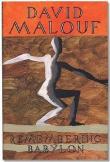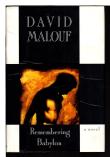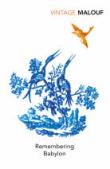AustLit
Latest Issues
AbstractHistoryArchive Description
'In the mid-1840s, a thirteen-year-old boy, Gemmy Fairley, is cast ashore in the far north of Australia and taken in by Aborigines. Sixteen years later, when settlers reach the area, he moves back into the world of Europeans, men and women who are staking out their small patch of home in an alien place, hopeful and yet terrified of what it might do to them.
Given shelter by the McIvors, the family of the children who originally made contact with him, Gemmy seems at first to be guaranteed a secure role in the settlement, but there are currents of fear and mistrust in the air. To everyone he meets - from George Abbot, the romantically aspiring young teacher, to Mr Frazer, the minister, whose days are spent with Gemmy recording the local flora; from Janet McIvor, just coming to adulthood and discovering new versions of the world, to the eccentric Governor of Queensland himself - Gemmy stands as a different kind of challenge, as a force which both fascinates and repels. And Gemmy himself finds his own whiteness as unsettling in this new world as the knowledge he brings with him of the savage, the Aboriginal.' - Publisher's blurb (Chatto & Windus, 1993).
Notes
-
Epigraph: 'Whether this is Jerusalem or Babylon we know not' (William Blake: The Four Zoas).
-
Epigraph: 'Strange shapes and void afflict the soul / And shadow to the eye / A world on fire while smoke seas roll / And lightnings rend the sky / The moon shall be as blood the sun / Black as a thunder cloud / The stars shall turn to blue and dun / And heaven by darkness bowed / Shall make sun dark and give no day / When stars like skys shall be / When heaven and earth shall pass away / Wilt thou Remember me' (John Clare).
Publication Details of Only Known VersionEarliest 2 Known Versions of
Other Formats
- Also braille,
- Sound recording.
- Large print.
Works about this Work
-
Desert Worlds
2019
single work
essay
— Appears in: Southerly , vol. 79 no. 1 2019; (p. 84-105) 'In late 1914, twenty thousand mostly young Australian men ventured forth from the driest inhabited continent on earth to cross the ocean in a convoy spread over twenty-five kilometres in length and measuring twenty kilometres in width. The greatest mass exodus from the Antipodes which included a further ten thousand New Zealanders, this was the first and largest of many similar voyages over the next four years. The Australians might have considered themselves to be desert people. “The sand has his own / Wave and motion,” wrote S. Musgrove in “Australia Deserta” in the first issue of Southerly in 1939, “Rages the bed / Of the stony ocean” (14). Yet they preferred to identify as colonial sons returning to the motherland of pastoral England before heading to war. Of their own place, “They call her a young country but they lie,” wrote A. D. Hope in his much debated poem “Australia” which he began writing around the time of the publication of the inaugural issue—and to which he contributed an essay—“She is the last of lands, the emptiest, / ... the womb within is dry” (Hope).'(Introduction)
-
Australien
2019
single work
criticism
— Appears in: Verdenslitteraturer : Introduktion til litteraturen uden for Europa 2019; (p. 253-284) -
Make a New World
2019
single work
essay
— Appears in: The Monthly , April no. 154 2019; (p. 56-60)'The article offers information about author David Malouf. It mentions that Malouf has extolled the complication of women in ancient Greek drama and written the book "Remembering Babylon" about Australian settlement. It also mentions that there was a grand push to triumphalise Australian literature post Bicentennial.' (Publication abstract)
-
y
 The Mabo Turn in Australian Fiction
Oxford
:
Peter Lang
,
2017
13852561
2017
multi chapter work
criticism
The Mabo Turn in Australian Fiction
Oxford
:
Peter Lang
,
2017
13852561
2017
multi chapter work
criticism
'This is the first in-depth, broad-based study of the impact of the Australian High Court’s landmark Mabo decision of 1992 on Australian fiction. More than any other event in Australia’s legal, political and cultural history, the Mabo judgement – which recognised indigenous Australians’ customary native title to land – challenged previous ways of thinking about land and space, settlement and belonging, race and relationships, and nation and history, both historically and contemporaneously. While Mabo’s impact on history, law, politics and film has been the focus of scholarly attention, the study of its influence on literature has been sporadic and largely limited to examinations of non-Aboriginal novels.
'Now, a quarter of a century after Mabo, this book takes a closer look at nineteen contemporary novels – including works by David Malouf, Alex Miller, Kate Grenville, Thea Astley, Tim Winton, Michelle de Kretser, Richard Flanagan, Alexis Wright and Kim Scott – in order to define and describe Australia’s literary imaginary as it reflects and articulates post-Mabo discourse today. Indeed, literature’s substantial engagement with Mabo’s cultural legacy – the acknowledgement of indigenous people’s presence in the land, in history, and in public affairs, as opposed to their absence – demands a re-writing of literary history to account for a “Mabo turn” in Australian fiction. ' (Publication summary)
-
The First Night Out of Eden : David Malouf’s Remembering Babylon
2017
single work
criticism
— Appears in: Literature and Theology , June vol. 31 no. 2 2017; (p. 215–230)'This article focuses particularly upon David Malouf’s novel Remembering Babylon as it examines Malouf as a spiritual writer whose works explore the liminality of space in Australia and the boundaries between worlds, both real and literary. The article moves between the classical studies of John Keble and the philosophy of Martin Heidegger to establish the place of the sacramental in Malouf’s writings, a novelist and poet who bears comparison with the French poet Yves Bonnefoy.' (Publication abstract)
-
[Review] Remembering Babylon
1993-1994
single work
review
— Appears in: The Commonwealth Review , vol. 5 no. 2 1993-1994; (p. 172-174)
— Review of Remembering Babylon 1993 single work novel -
Do Not Shoot : I Am a British Object
1993
single work
review
— Appears in: The CRNLE Reviews Journal , no. 2 1993; (p. 30-32)
— Review of Remembering Babylon 1993 single work novel -
Artful
1994
single work
review
— Appears in: Quadrant , January-February vol. 38 no. 1-2 1994; (p. 115-117)
— Review of Crocodile on the Thames 1993 single work novel ; Art Rat 1993 single work novel ; Remembering Babylon 1993 single work novel ; Bitters End 1993 single work novel -
Centring the Other
1993
single work
review
— Appears in: Voices , Winter vol. 3 no. 2 1993; (p. 117-120)
— Review of Remembering Babylon 1993 single work novel -
Destined to Endure
1993
single work
review
— Appears in: Australian Book Review , May no. 150 1993; (p. 6-7)
— Review of Remembering Babylon 1993 single work novel -
Racializing Babylon : Settler Whiteness and the 'New Racism'
2001
single work
criticism
— Appears in: New Literary History , Winter vol. 32 no. 1 2001; (p. 159-176)This article examines the portrayal of settlers as consciously differentiating their whiteness from what they regard as inferior races and cultures and discusses white Australia's process of reconciliation with Aboriginal Australia.
-
The Paradoxes of Marginalisation : David Malouf and the 'Great World'
2002
single work
criticism
— Appears in: The Global and the Particular in the English Speaking World 2002; (p. 97-105) -
Alchemical Tropes of Irish Diaspora in David Malouf's Conversations at Curlow Creek and Remembering Babylon
2002
single work
criticism
— Appears in: Nordic-Irish Studies , no. 1 2002; (p. 63-76) -
B-b-british Objects : Possession, Naming, and Translation in David Malouf's Remembering Babylon
2002
single work
criticism
— Appears in: PMLA , October vol. 117 no. 5 2002; (p. 1158-1171) Author's abstract: 'Imported material forms were central to the settlement of Australia as a penal colony, beginning with the "discovery" of the continent by James Cook, who took possession of New South Wales in 1770 by naming Possession Island. The first part of this article traces the intersection in early journals and legal records between material instability and naming, arguing that as Aboriginal peoples and convicts challenged the social meaning of objects, the ability to refer to those objects became essential. The second part explores failed naming in David Malouf's novel "Remembering Babylon" (1993), set on the early-nineteenth-century frontier, whose central character calls himself a "B-b-british object," stuttered words that evoke the historical importance and the vulnerability of imported goods during colonization and settlement in Australia.' -
The Call of the Wild : The Strange Cases of David Malouf's Gemmy Fairly and Arun Joshi's Billy Biswas
2003
single work
criticism
— Appears in: Austral-Asian Encounters : From Literature and Women's Studies to Politics and Tourism 2003; (p. 156-163)
Awards
- 1996 winner International IMPAC Dublin Literary Award
- 1995 winner Prix Baudelaire (France)
- 1994 winner Prix Femina (France) — Best Foreign Novel
- 1994 shortlisted NBC Banjo Awards — NBC Banjo Award for Fiction
- 1994 winner Commonwealth Writers Prize — South-East Asia and South Pacific Region — Best Book from the Region Award
- Bowen area, Marlborough - Mackay - Townsville area, Queensland,
- Brisbane, Queensland,
- 1800-1899







